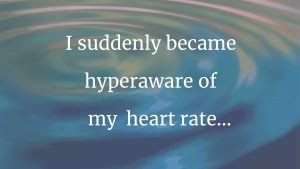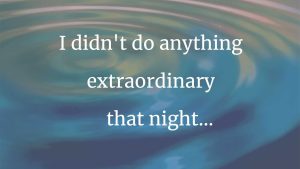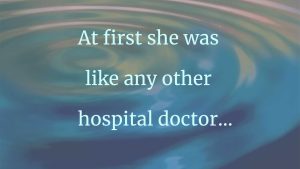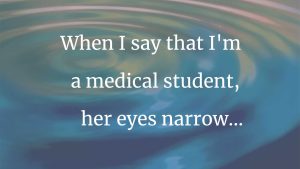Stewart Decker
I’ve made a huge mistake, I thought.
The fever had come back. The fever had come back, and I was stuck on a bus. The first of five buses, actually….
I am a fourth-year medical student at the University of Minnesota, but right now I’m a long way from home. I am spending a year in South America, studying international public-health issues by working in emergency rooms, non-governmental organizations (NGOs), social projects and surgical suites.
When this story began, I’d been living in a small, remote town called Central Yuu, in the Ecuadorian jungle, helping the villagers to build a potable-water spring-protection system. It was on a rainy day there that I collected a connect-the-dots pattern of insect bites on my ankles.
The fevers started one Tuesday night, coming and going, bringing sweat and chills, pain behind the eyes and a debilitating ache in muscles and bones.
The local hospital staff said that I’d contracted dengue fever, a mosquito-borne tropical disease also known as “break-bone fever” for the pain it inflicts on joints and muscles. Dengue rarely kills, and it usually passes within five to seven days, but there’s no get-rid-of-it-quick treatment: you’re told to rest, stay hydrated, take ibuprofen and tough it out.
I was unable to sleep the first night, nor the following ones; fever dreams shattered my rest.
In a society where your identity is often forged by what you do, illness can redefine you. A common cold merely forces you to carry tissues around, but a major illness bends you to its will.
As I lay in my sweat-soaked bed or struggled to walk to the bathroom, I stopped being someone who enjoys playing soccer, climbing mountains and hiking. I became an amalgam of fevers, chills, weakness and pain.
I’d been looking forward to two weeks of mountaineering, but my plans ceased to matter: these days belonged to dengue. I canceled my goal of summiting Ecuador’s highest mountain, Chimborazo, choosing instead the humbler aim of getting a decent night’s sleep.
Even this remained out of reach. Still, I was hoping that I could shake the virus in time to make the two-day bus journey to the Peruvian Andes to hike the Huayhuash circuit with my friend Michael, who was traveling from Cusco. We’d agreed to rendezvous in Huaraz, a town near the trailhead. I’d already bought my ticket.
My bus was scheduled to leave on Sunday night–five days after my fever began, and the first day I could possibly hope for an improvement.
If I feel better by Sunday afternoon, I’ll go, I decided.
When Sunday arrived, it brought a break in my symptoms.
It’s over, I thought cheerfully, hopping on the bus.
Two hours later, my mounting fever and resurgent aches told me otherwise.
Eventually this will pass, I told myself, buoyed by the rest enforced by the bus’s steel walls and partially reclining seats.
In trying to hold onto my optimism, though, I faced one overwhelming obstacle: I was alone.
None of my fellow passengers spoke to me. They cast sidelong glances, whispering among themselves: “Contagioso… peligroso… desconsiderado…” (contagious… dangerous… inconsiderate).
I wanted to tell them that dengue is not contagious, but I was in no state to talk.
At every leg of the journey, each new bus brought a fresh mix of passengers–tourists, villagers, businesspeople. The cast of characters kept changing, but they all acted the same: wary and evasive, avoiding eye contact, careful not to get too close. Paradoxically, being with them made me feel even more alone.
Of course there was no internet access, and at some point my cell phone died. This completed my sense of isolation.
As the bus rattled on, my existence was reduced to pain–past, present and future. I knew only the coals behind my eyes, the vice at my temples, the ache of every movement and the weakness of a body that had once been strong.
Stuck on board this sweaty, hostile fever-machine, I longed for someone to care for me, or simply about me. The bus ride would last forty-three hours; only six hours in, I felt despair engulf me. Even though I knew objectively that my illness would pass, I wished I could die.
Thirty-seven hours to go.
I’ve never felt more overwhelmed, crushed, hollow, helpless. It wasn’t by force of will that I made it through–I was simply incapable of doing anything but watch the minutes and miles claw agonizingly by.
Thirty-six hours to go.
Wobbling off of the last bus, I collapsed into a cab that brought me to the hostel, where Michael immediately sent me to bed. He left for Huayhuash the next day, and I stayed behind, finally able to rest horizontally.
It was another two days before my fever broke.
As I write this, I’ve been fever-free for months. In the two weeks following my illness, though, I felt humbled by muscles that seemed feeble and foreign: weak replacement muscles, like the spare tire on a compact car. I trusted that my weakness would soon fade, but I knew that what I’d learned would stay with me forever.
Now I know the awful weight of loneliness when no one cares about you. I know what a priceless balm it is, when you’re sick, to have someone spend time with you. I know the power of both hope and despair–and how loneliness can turn one into the other.
I realize that I was lucky: my illness was destined to pass from the start. I also know that many others who become ill are not so lucky–and that offering them the gift of time, attention and understanding can mean everything.
So to all my future patients, I make this pledge: I will be on watch for loneliness. I will recognize and address despair. I will handle hope honestly. I will make sure you know that I care.
Most importantly, I will find ways to spend time with you–especially if you don’t have anyone else. I will stop by to check in, to say hello or goodnight. I will strive to know you, not just your disease process.
Because I’ve been there.
About the author:
Stewart Decker is a fourth-year medical student at the University of Minnesota. He plans to go into family medicine and to practice in a rural setting with an emphasis on community health; he also intends to work on public health policy. These interests have grown out of his experiences as a social worker, as an emergency medical technician and as an NGO project manager, training community health workers in Peru.
Story editor:
Diane Guernsey







14 thoughts on “Solitary Confinement”
Maybe because I recently saw “Inside Llewyn Davis,” I pictured that bus ride scene. I thought Stewart was foolish to have attempted the trip in his condition, but he acknowledged his mistake in the first sentence. Making that unwise decision may end up positively affecting hundreds or thousands of lives over the course of the future Dr. Decker’s career. My hope for you is that you will always be able to recall the loneliness and despair and never forget the lesson you learned. Well done.
As one who has lived most of her life with a chronic disease, I want to say thank you in advance for all the patients you will treat. It means a lot when a physician gets to know a person as a patient and not just as one who has a particular disease. Your patients may not always tell you what it means but I know they will feel it. I wish you all the best!
Empathy is a deep concept…I believe you’ve got it! Moved by your finishing statement…”I will strive to know you, not just your disease..” God will bless you & give great favor at whatever you put your hand to!
Thank you for sharing this. What an amazing experience to carry into your career and what a blessing for those who are your patients.
Dengue fever hit Kingston Jamaica hard in 1977 and I was one of its victims. I lay in bed for days, alone, too weak to stand. Bright spikes of pain shot through my head when I moved my eyes. I heard my apartment door open and shut. Someone brought a bottle of orange juice but didn’t look in on me. I was too weak to get it for a couple more days. Stewart’s story brought it all back, vividly. Let me thank the Project HOPE employee who brought me that bottle. You very well might have saved my life.
Wow Anita, it sounds like you had quite the experience too! I am glad that you made it out ok.
Simply beautiful.
Thank you Ana!
Well told story. Your future patients will benefit from your thoughtful, intentional compassion. Still, I am sorry you had to experience that loneliness and despair. There is purpose in the pain we experience and it is a blessing to be able to see that!
The “purpose in the pain” lesson is one of the best things I picked up from my parents. It certainly is good to have good role models, right?
Dear Mr. Decker,
I hope you give yourself plenty of credit for taking away such compassionate thoughts and plans for your future practice. You could have passed off the story as an anecdote about life in the 3rd world; instead you learned from it.
With respect,
Dorothy
My role models (parents, etc) taught me long ago to look everywhere for things to learn. Even illness and annoying people have truth to share, sometimes, and only of you pay attention. 🙂 Thank you!
Stewart,
You did it! You achieved bringing your readers ( me included) close to the bone of your awful journey into and with dengue ALONE and the torture of the loneliness when you felt to helpless, so uncared for amidst excruciating symptoms. I don’t know if I am most grateful for your taking the time to bring us there or your commitment to learn and “care” as a result. Both have changed me.
Marita
Thank you Marita!